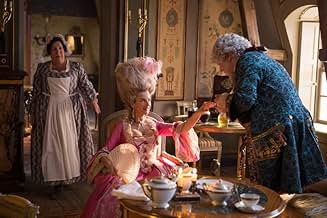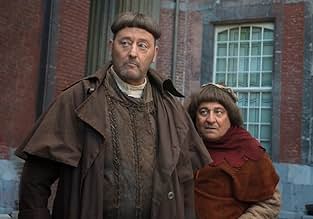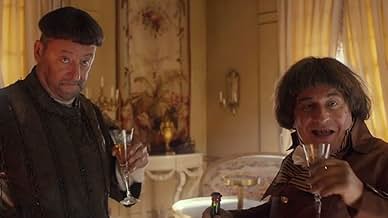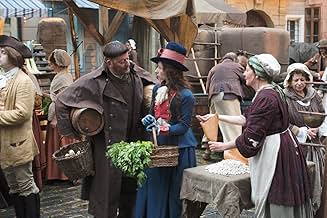AVALIAÇÃO DA IMDb
4,6/10
5,1 mil
SUA AVALIAÇÃO
Adicionar um enredo no seu idiomaKnight Godefroy de Montmirail and squire Jacquouille are stranded in 1793. Using trickery to break free from their shackles, both perilously partake in the Montmirail family's run away in th... Ler tudoKnight Godefroy de Montmirail and squire Jacquouille are stranded in 1793. Using trickery to break free from their shackles, both perilously partake in the Montmirail family's run away in the quest for an exiting time-shift.Knight Godefroy de Montmirail and squire Jacquouille are stranded in 1793. Using trickery to break free from their shackles, both perilously partake in the Montmirail family's run away in the quest for an exiting time-shift.
- Direção
- Roteiristas
- Artistas
Eric De Staercke
- Le duc hollandais
- (as Eric de Staercke)
Avaliações em destaque
Now in the 21st century, many people are criticizing movies for racism and the like. I'm not a racist, but I think all jokes have a right to life, it's just a joke (and yes, it was really funny to me). I really liked the third film, as well as the previous two. I don't understand why the film has such a low rating. So I just have to put 10/10. The situation needs to be corrected. Glory to French cinema!
The first one is surely a candidate for best French film of all-time for its pure thick comedy, the history, the emotions, the soundtrack, iconic actors, and one of the most celebrated directors in the country.
The second wasn't as bad as they say. This however, even with as much effort as it is fair to concede, still comes across as too weak.
The problem first of all is they focused too much on story, not enough on funny. It IS a Visiteurs film after all, not a historical document. They had much to work with as comedians during that rusty old time of post-revolution France, and yet they settled for a group of aristocrats as the main new addition as a source for humor; albeit well written, well acted out by notably Karin Viard who does fantastic as the uptight super hypocritical noblette.
No need to spend an hour here: not funny enough, did not exploit the potential of either the classic old elements or the new environment; story is alright but certainly forgettable and only a framework for a mediocre comedy movie.
Dubosc adds his own little touch, is funny on a couple of line deliveries, but nothing more.
4/10.
The second wasn't as bad as they say. This however, even with as much effort as it is fair to concede, still comes across as too weak.
The problem first of all is they focused too much on story, not enough on funny. It IS a Visiteurs film after all, not a historical document. They had much to work with as comedians during that rusty old time of post-revolution France, and yet they settled for a group of aristocrats as the main new addition as a source for humor; albeit well written, well acted out by notably Karin Viard who does fantastic as the uptight super hypocritical noblette.
No need to spend an hour here: not funny enough, did not exploit the potential of either the classic old elements or the new environment; story is alright but certainly forgettable and only a framework for a mediocre comedy movie.
Dubosc adds his own little touch, is funny on a couple of line deliveries, but nothing more.
4/10.
Les visiteurs come back again, now in french revolution's peak, there are a lot of gags and jokes, the most interesting is about the old servant Jacquouville who now understand that he no longer needs to serves his master, they are equal, let's face firstly the odd french humor from Christian Clavier as a nasty and stinker man, wasn't to all taste, l'd watch several comic movies from french and they had his own style properly for them, unusual for our standards, they speak so fast that infringes each other which has some difficulty to able a prompt line of reasoning, sometimes l'd to stop to try understand it on first time, it's a format just to french audience who are already accustomed with this concept, but still funny!!
Resume:
First watch: 2019 / How many: 1 / Source: DVD / Rating: 5.5
Resume:
First watch: 2019 / How many: 1 / Source: DVD / Rating: 5.5
In 1998, "The Visitors" saga concluded on a rather frustrating cliffhanger. Godefroy the Brave (Jean Reno) and his faithful servant Jacquouille (Christian Clavier) were, once again, misdirected in the corridors of time and left prisoners during the French Revolution. The film ended on a note that seemed to say "we don't care for continuity as long as there's a gag" (as if our beloved medieval characters in a cage would be a pleasing sight).
Still, the film met with commercial success, but apart from the American remake (which I thought was better), it seemed like the director, Jean-Marie Poiré, the actors and certainly the spectators were done with "The Visitors". Until 2015 when the first teasers of two aging and uglier-looking Godefroy and Jacquouille made it clear that "The Visitors" would finally make a trilogy, how about that?
On the positive side, I thought it was inevitable since they had to come back to their time. Besides, there was no way it could be worse than the sequel and maybe the writers' team made of Poiré and Christian Clavier had time to prepare an entertaining and funny story that wouldn't rely on cheap jokes and special effects. On the other hand, I was afraid the film would be an attempt to give a 2010's flavor to the series by inserting so many 'trendy' stars (the casting of bankable Frank Dubosc and Ary Arbittan didn't reassure me). But I didn't have time to set up my anticipations as the first negative signals started to ring: no premiere, the Press couldn't watch the film before the release, talk about self-confidence.
And then came the (vengeful?) critics: a cinematic disappointment with an overuse of poo-poo jokes, an insistence on bad smell even more incongruous in the unhygienic context of the Revolution. More constructive critics denounced the disjointed aspect of the scenario, the overdose of artificial lighting to suggest night and the wooden acting of Reno who seemed more absent than usual. But the criticism that worried me the most was that: the film had no end. Whatever it meant, it really set my worries high and my expectations low, very low.
The start was promising though with the summaries of the previous films crawling à la "Star Wars", I didn't expect to smile so early. Then we're put in the Middle-Ages, paler and more pastel tones than in the first films, Godefroy and Jacquouille make a spectacular yet confusing entrance, since they're supposed to be in 1793. Indeed, it was all a dream by one of the soldiers. Later, the King orders them to find Godefroy, otherwise, his lands will be taken and he'll have no descendants. Why did they bother with that subplot since Godefroy had a mission already? As uninspired as it was, Godefroy was supposed to come back, marry Frénégonde, give her some sacred relic and close the corridors of time to prevent the plague. No continuity isn't such a big deal, but so early, it makes you expect the worst.
But I guess, I've been so thoroughly prepared for this worst that as long as they were not shown defecating on the screen or farting on others' faces, it was okay. At the end, it wasn't too bad. Actually, I've been even pleasantly surprised that the film contained more restrained part than the sequel, moments full of verbal interactions about the Revolution, classes, human rights and other 'hip' stuff, that and a great dinner scene with Robespierre (played by a chilling Nicolas Vaude). It's true the two protagonists were left behind for a while, but at least the film remained consistent with its subtitle.
And while there were a few nice nods to the original film: Marie-Anne Chazel in the cast, Godefroy being again mistaken for a distant cousin and so forth, it is true that the film insisted upon itself when it came to the smell and fecal jokes, even lengthy conversations were on the same register, like one between between the Brave and a pompous Italian aristocrat played by Arbittan, something about the honor to wipe the Royal ass. Ten seconds is the limit to maintain such a joke, but the film gratifies us with so many references to odors or feet, that it almost spilled over the script. It came to a point I was breathing heavily when Jacquouille had to serve a chocolate pie to Marat.
But on a more positive side, I liked the way this film connected with the first where 'Revolution' was a preeminent theme, one that even inspired Jacquouille to stay. It also showed his descendant, one of Robespierre's under-bosses, taking his former masters' land, thus starting his family's fortune. Even Dubosc, more restrained than usual, shone as Gonzague de Montmirail, referenced many times in the first. The others Montmirails were not foils for Clavier's antics, and happened to be so interesting that we didn't need Godefroy and Jacquouille on screen. Indeed, they provided great insights about the revolution from their own standpoint. They're the refugees and citizens, from the people, are eager to denounce them for money.
When you know the historical weight of 'denunciation' in France, the film doesn't quite honor the Revolution. And who knows maybe this revisionism appaled the oh-so republican press, who branded the film as reactionary. But it was gutsy to have such a taboo-breaking approach, it just get diluted in too many jokes and twists that the film inevitably failed to deliver its premise. Worse, it indeed didn't have time to end, and what could have been a terrific redeemer made it worse. Even as a joke, the ending could have worked, but the film suffers from the eternal syndrome of French comedy: rushed ending.
The ending (or lack of) wasn't without a meaning, and a strong one, but I wish they had time to rework the film, a few scenes cut, a few adds, it could have been something.
Still, the film met with commercial success, but apart from the American remake (which I thought was better), it seemed like the director, Jean-Marie Poiré, the actors and certainly the spectators were done with "The Visitors". Until 2015 when the first teasers of two aging and uglier-looking Godefroy and Jacquouille made it clear that "The Visitors" would finally make a trilogy, how about that?
On the positive side, I thought it was inevitable since they had to come back to their time. Besides, there was no way it could be worse than the sequel and maybe the writers' team made of Poiré and Christian Clavier had time to prepare an entertaining and funny story that wouldn't rely on cheap jokes and special effects. On the other hand, I was afraid the film would be an attempt to give a 2010's flavor to the series by inserting so many 'trendy' stars (the casting of bankable Frank Dubosc and Ary Arbittan didn't reassure me). But I didn't have time to set up my anticipations as the first negative signals started to ring: no premiere, the Press couldn't watch the film before the release, talk about self-confidence.
And then came the (vengeful?) critics: a cinematic disappointment with an overuse of poo-poo jokes, an insistence on bad smell even more incongruous in the unhygienic context of the Revolution. More constructive critics denounced the disjointed aspect of the scenario, the overdose of artificial lighting to suggest night and the wooden acting of Reno who seemed more absent than usual. But the criticism that worried me the most was that: the film had no end. Whatever it meant, it really set my worries high and my expectations low, very low.
The start was promising though with the summaries of the previous films crawling à la "Star Wars", I didn't expect to smile so early. Then we're put in the Middle-Ages, paler and more pastel tones than in the first films, Godefroy and Jacquouille make a spectacular yet confusing entrance, since they're supposed to be in 1793. Indeed, it was all a dream by one of the soldiers. Later, the King orders them to find Godefroy, otherwise, his lands will be taken and he'll have no descendants. Why did they bother with that subplot since Godefroy had a mission already? As uninspired as it was, Godefroy was supposed to come back, marry Frénégonde, give her some sacred relic and close the corridors of time to prevent the plague. No continuity isn't such a big deal, but so early, it makes you expect the worst.
But I guess, I've been so thoroughly prepared for this worst that as long as they were not shown defecating on the screen or farting on others' faces, it was okay. At the end, it wasn't too bad. Actually, I've been even pleasantly surprised that the film contained more restrained part than the sequel, moments full of verbal interactions about the Revolution, classes, human rights and other 'hip' stuff, that and a great dinner scene with Robespierre (played by a chilling Nicolas Vaude). It's true the two protagonists were left behind for a while, but at least the film remained consistent with its subtitle.
And while there were a few nice nods to the original film: Marie-Anne Chazel in the cast, Godefroy being again mistaken for a distant cousin and so forth, it is true that the film insisted upon itself when it came to the smell and fecal jokes, even lengthy conversations were on the same register, like one between between the Brave and a pompous Italian aristocrat played by Arbittan, something about the honor to wipe the Royal ass. Ten seconds is the limit to maintain such a joke, but the film gratifies us with so many references to odors or feet, that it almost spilled over the script. It came to a point I was breathing heavily when Jacquouille had to serve a chocolate pie to Marat.
But on a more positive side, I liked the way this film connected with the first where 'Revolution' was a preeminent theme, one that even inspired Jacquouille to stay. It also showed his descendant, one of Robespierre's under-bosses, taking his former masters' land, thus starting his family's fortune. Even Dubosc, more restrained than usual, shone as Gonzague de Montmirail, referenced many times in the first. The others Montmirails were not foils for Clavier's antics, and happened to be so interesting that we didn't need Godefroy and Jacquouille on screen. Indeed, they provided great insights about the revolution from their own standpoint. They're the refugees and citizens, from the people, are eager to denounce them for money.
When you know the historical weight of 'denunciation' in France, the film doesn't quite honor the Revolution. And who knows maybe this revisionism appaled the oh-so republican press, who branded the film as reactionary. But it was gutsy to have such a taboo-breaking approach, it just get diluted in too many jokes and twists that the film inevitably failed to deliver its premise. Worse, it indeed didn't have time to end, and what could have been a terrific redeemer made it worse. Even as a joke, the ending could have worked, but the film suffers from the eternal syndrome of French comedy: rushed ending.
The ending (or lack of) wasn't without a meaning, and a strong one, but I wish they had time to rework the film, a few scenes cut, a few adds, it could have been something.
I just finished the 10th rewatch of this move. Its just better and better every times. I completly understand the so many historical jokes and comic scenes and just like it and still laugh many times. I know the most people dont get it because its a very special humor.
I can say its the most seriously underrated but simply best piece of Les visiteurs series. I can advise to watch it multiple times and you may get it! :D
Você sabia?
- CuriosidadesFirst film directed by Jean-Marie Poiré since Ma femme... s'appelle Maurice (2002), 14 years from now.
- Erros de gravaçãoJacques-Henri Jacquart appears to be in his 30s or 40s in the 1990s; actor Christian Clavier was 40 when the first film was shot. However, he appears as a boy aged around 10 during World War II, which means he should be around 60 at the start of the 1990s.
- ConexõesFollows Os Visitantes: Eles Não Nasceram Ontem! (1993)
Principais escolhas
Faça login para avaliar e ver a lista de recomendações personalizadas
- How long is The Visitors: Bastille Day?Fornecido pela Alexa
Detalhes
- Data de lançamento
- Países de origem
- Centrais de atendimento oficiais
- Idiomas
- Também conhecido como
- The Visitors: Bastille Day
- Locações de filme
- Empresas de produção
- Consulte mais créditos da empresa na IMDbPro
Bilheteria
- Orçamento
- € 24.754.646 (estimativa)
- Faturamento bruto mundial
- US$ 18.552.314
- Tempo de duração
- 1 h 50 min(110 min)
- Cor
- Proporção
- 2.35 : 1
Contribua para esta página
Sugerir uma alteração ou adicionar conteúdo ausente





























